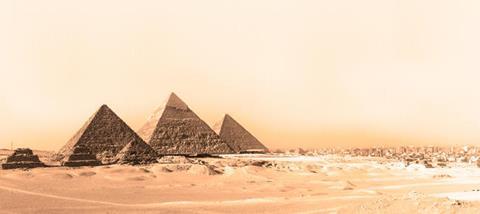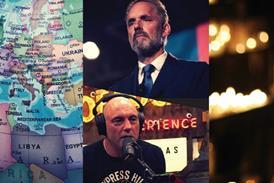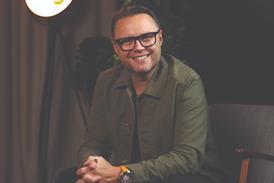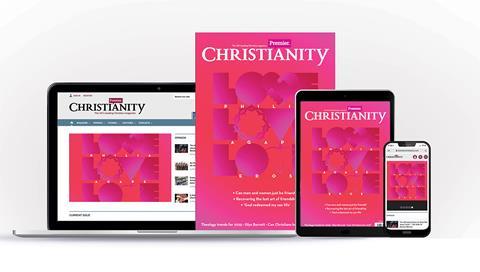
Kasr el Dobara (Dobara Palace) was built on land that was given to the church by Egypt’s King Farouk. But when the king saw the completed church in its prime position facing Tahrir Square in the late 1940s, he was ‘so angry with himself’, according to Pastor Sameh, ‘that he built an administrative building between the church and the square’.
Little did Farouk know that the administrative building would act as a shield for the church from the violent protests in Tahrir Square in the 2011 Egyptian Revolution. This enabled the church to establish a field hospital in its courtyard, in partnership with a nearby mosque. Such an active partnership between an evangelical church and a mosque is unusual. This partnership began during the first wave of protests, when the church was closed as violent battles erupted around it. The only people to be found in the building were members of its leadership team. They were approached by Muslims who wanted to use the church’s water supply so they could carry out their ritual ablutions before praying in the square.
Kasr el Dobara’s leaders agreed, recognising that churches are places of refuge. Their decision resulted in an unexpected offer. ‘They invited us to have a worship service on Friday morning after their time of prayer in the square,’ shares Pastor Sameh. ‘We sent a team to pray and to worship the Lord in Tahrir Square. In the first three weeks of the revolution, we became visible.’
Most Egyptian Christians are part of the Coptic Orthodox Church, and the team included prayers from the Orthodox liturgy. ‘We did it in a way that said: We are not here as evangelicals; we are Christians.’
PATIENTS ARRIVED WITH A RANGE OF INJURIES, FROM BROKEN BONES TO GUNSHOT WOUNDS
IN JESUS’ NAME
One of the Christians leading worship in the square was Dr Ehab el Kharrat, a church elder at Kasr el Dobara. ‘I told them that there was a young man in his early 30s who stood up against hypocrisy, against tyranny, against corruption, and was ready to give his life,’ says el Kharrat.
‘I told them that this young man’s name was Jesus the Christ, son of Mary. And the whole crowd went wild in jubilation and greeting to the name of our Lord. And then I said, “We haven’t won the battle yet. The battle is against the spirit of fear. And I will pray now to rebuke the spirit of fear in the name of Jesus.”
‘I said: “In the name of Jesus I rebuke the spirit of fear from the heart of Egypt.” ‘I said this three times and the crowd shouted it after me.
‘A prominent older revolutionary leader, a Muslim, Mr Hamdi Qandil, took the loudspeaker after me, and he said: “I agree with these great words and I, too, in the name of Jesus, rebuke the spirit of fear.”’
The second wave of the revolution provided another opportunity for the church and mosque to work together as the focus of the protests and the violent counteraction by the security forces shifted to Tahrir Square itself.
‘The situation in the square was increasing until the attacks turned to be like a war in the street,’ says Eva Botros, who coordinates the church’s voluntary programme. ‘The wounded people became unlimited and some of the Muslim doctors who were offering little field hospitals in the streets ran towards the wall of our church and said, “Can we hide our stuff?”
‘I connected them with our pastor and said, “We have doctors at the door. They are being attacked by the army and by the police and they can’t make a field hospital.” In a very courageous way, he said: “Help them inside the church.” And that’s how the field hospital started.’
PARADISE HOSPITAL
The hospital began as a front line first-aid facility, with piles of blankets used to fashion makeshift beds. But it soon became the leading medical institution in Cairo. Top doctors from the city’s hospitals and medical universities relocated to the church; the health ministry sent equipment, including beds and trolleys; operating theatres were established in the courtyard; and ambulances took the injured to the church rather than to hospitals, knowing that they had a much better chance of survival if they were treated there. Patients arrived with a range of injuries, from broken bones to gunshot wounds.
‘We became very much associated with the nearby mosque, which is the mosque of Tahrir Square,’ Pastor Sameh said. ‘The doctors were going back and forth from their place to our place, so we became like one family. I remember [in] three days we had 500 casualties, 400 casualties, 300 casualties; mostly Muslims. There were sometimes wounded soldiers. We treated them and then allowed them to escape through another door, otherwise some protestors might kill them.
‘We were serving everybody and many doctors came to help us and they considered the church their place, their home. It was a real reconciliation between the Christian community and the Muslim community inside the church. Many of them said, “This is a paradise. This is the best place in Egypt.”’
THE SHELTER OF EGYPT
Kasr el Dobara was already familiar to Christians in Egypt due to its weekly broadcast on Christian Arabic television channel SAT-7. But by this time it was coming to the attention of ordinary Egyptians.
‘You can’t imagine how it was. Every day we were on the TV,’ says Botros. ‘They were saying what was going on in the square, what was going on all over Egypt, and what was going on in Kasr el Dobara church. It was as if the Lord wanted to lift it up.’
One television channel carried constant live pictures from the church amid its onscreen coverage of the protests. On one occasion, a message went out on Twitter to say that the army was attacking the church. The response, Botros says, was ‘remarkable’.
‘Members of the Egyptian parliament, religious leaders and other celebrities stood between the troops and the church with a message that anybody attacking Kasr el Dobara was attacking “the shelter of Egypt”,’ she says.
The church continued to work with its Muslim neighbours after the revolution had ended. ‘We felt in our hearts that it was appropriate to celebrate and also to invite our Muslim brothers and sisters to worship,’ explains Pastor Sameh. ‘So we made an announcement that we would honour those that led the revolution and made it happen – the young people, the journalists and media, and the families who lost a son, a husband – and we would give them certificates to honour them. It was a few days after the revolution.
‘We had so many people attending: thousands. It was another day of joy. And the secular media covered this event in a big way. We were the first to honour the martyrs and their families.’
Egypt’s recent history
July 1952 King Farouk is deposed in a revolution that sees independence for Sudan and the end of Britain’s 70-year occupation of Egypt.
October 1981 Vice-president Hosni Mubarak becomes the fourth President of Egypt after the assassination of President Anwar El-Sadat. Egypt’s post-revolution constitution would keep him in power for the next 30 years.
January 2011 Fuelled by the Arab Spring, protests against Mubarak’s autocratic rule break out in Cairo’s Tahrir Square and elsewhere in Egypt.
February 2011 Mubarak appoints Omar Suleiman as vice-president and stands down as president. The Armed Forces assume control of the country.
December 2011 Secular television channels begin to relay SAT-7’s coverage of a New Year’s Eve prayer service at Kasr el Dobara church. Hundreds more people, including MPs and prominent Muslims, turn up at the church for the service, which continues past 4am.
June 2012 Muslim Brotherhood leader Mohamed Morsi is elected as the new President of Egypt with almost 52% of the vote.
November 2012 Morsi effectively tears up the new Egyptian constitution, granting himself unlimited powers to legislate without oversight. He makes moves to hold a referendum on a new Islamist constitution.
Seventy thousand Christians gather at St Simon’s Coptic Orthodox Church in Cairo, known as the Cave Church, for a united prayer service. It is the largest Christian gathering in Egypt’s modern history, the first time that Coptic Orthodox, Catholics and all branches of Protestant and evangelical Christians come together.
June 2013 On the first anniversary of Morsi’s election, thousands of Egyptians (some reports suggest millions) once again take to the streets in protest.
July 2013 Head of the armed forces, Abde Fattah al-Sisi, deposes President Morsi and suspends the constitution.
August 2013 Moves against the Muslim Brotherhood gather pace with the removal of provincial governors who are members of the party. Pro-Brotherhood protest camps in Cairo and across Egypt are cleared by security forces.
As a result, on 15-16th August, Egyptian churches and Christian organisations are attacked by supporters of the Muslim Brotherhood. Eighty-one churches and nine other Christian organisations are burned. The Egyptian Army later announces that it will rebuild the churches.
May 2014 Abde Fattah al-Sisi is elected President of Egypt with popular support
POLITICS OVER TEA
When President Mubarak stood down, the country was effectively without leadership. Pastor Sameh invited leaders from the various factions to a face-to-face meeting over coffee. ‘I said at the beginning, “I cannot lead this, I am a pastor. I believe in separating religion from politics. This is a political meeting, so elect somebody from [among] you to lead this meeting and we will serve coffee and tea,”’ he recalls.
The discussions facilitated by the church resulted in the drafting of the first post-revolution constitution and elections. ‘Again, the people recognised that we as a church were very patriotic: we want to do something to serve the country,’ says Pastor Sameh.
One of the leaders who attended the meetings was Dr el Kharrat, who was later elected as a member of the Shura Council, the upper house of Egypt’s parliament, in the first post-revolution elections. He was appointed to chair the Shura’s human rights council but stood down before the second revolution in protest at President Mohamed Morsi’s failed attempt to turn the country into an Islamic state.
Dr el Kharrat is highly respected as a political commentator and, during the first revolution, began to broadcast Bridges, a weekly live political discussion programme on SAT-7. Some 40% of his viewers are non-Christians.
‘We have begun to raise the awareness of the spiritual influence in politics,’ el Kharrat says. ‘We are encouraging Christians to be involved in politics from a broader consciousness. Rather than saying, “We demand our rights as Christians,” we say, “We demand justice and dignity and freedom for all, including Christians. We demand religious freedom for all.” We put the public interest prior to the interest of our churches.’
He continues: ‘More and more Christians are thinking of politics not as the devil’s den or a place of corruption, but as a space to practise your desire to serve the Lord and serve the people.’
LET THE BUILDINGS BURN
When the army deposed Morsi and cleared his Muslim Brotherhood supporters from sit-ins across the country, the Muslim Brotherhood responded by attacking a number of Christian organisations and burning 81 churches.
‘The pastors and priests of churches called for young people not to defend the buildings. They said: “Your lives are more worthwhile,” el Kharrat says. ‘Many Muslim neighbours tried to defend the churches. [The church leaders] told them: “No! Let the churches burn. They can be rebuilt. Protect your lives.”’
Rather than retaliating, the Christian leaders said the damage to their buildings was a price worth paying for a country that was in a better state. ‘We are now in a better situation. We don’t have a dictatorship like Mubarak; we don’t have a theocratic regime like the Muslim Brotherhood. If we play it right we will have right parties, we will have right politics. We will write a new history,’ Pastor Sameh says.
‘The Muslim Brotherhood tried to set up a civil war between Christians and Muslims, but the Christians didn’t respond in that way,’ explains Farid Samir Garas, executive director of SAT-7 Egypt. He says that, as a result, ‘They were seen as loving citizens, as patriots.’
OUT OF EGYPT THE LIGHT WILL COME TO THE ARAB NATIONS
FREE TO BELIEVE
As well as broadcasting weekly acts of worship, and the Bridges public affairs programme, SAT-7 broadcasts live from the church’s Count It Right festival, which brings more than 40,000 Christian teenagers to Wadi el Natrun, a desert site north of Cairo, for four days of worship, games, teaching and fun. The festival is also attracting a growing Muslim following.
According to Pastor Sameh, this is because people ‘are free now to think and to express their faith’. ‘[This] freedom of thinking and freedom of expression will lead many people to salvation,’ he believes.
‘The power of fear, the power of oppression, the power of dominion was really broken. Last year at this festival we had 1,000 Muslims attending every day. Today, the secret police stopped a Muslim lady, a veiled lady, and asked to see her ID. “How come you are Muslim coming here?” [one of them] asked. So a group went to him and said, “Now we have freedom. Give her back her ID!”’
Prior to the revolutions, Pastor Sameh says the police stopped buses going to the festival to check ID cards in a bid to prevent Muslims attending, but that people have become more assertive about protecting their newfound freedom.
Kasr el Dobara owns the site at Wadi el Natrun, including a sports stadium that seats thousands for youth-oriented worship evenings. The church now attracts around 500 people to its regular Sunday services. Up to 3,000 attend its bigger events. ‘We have a vision that has been the same for 40 years: that Jesus would be known to the Egyptians; that this land would be covered with the knowledge of Christ as he promised, and out of Egypt the light will come to the Arab nations,’ says Pastor Sameh. ‘This is the vision we live for, and for this reason we pray and pray and pray and pray and pray.’
Click here to receive your free copy of Premier Christianity magazine.



























